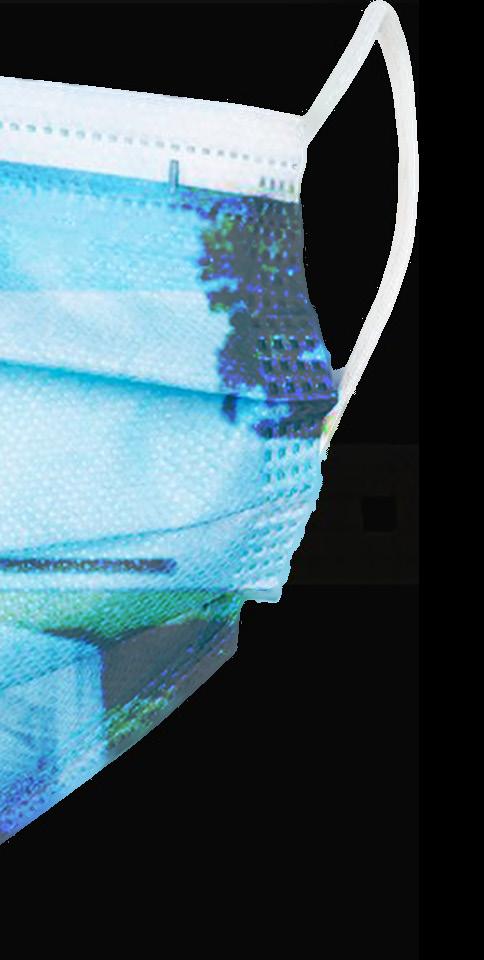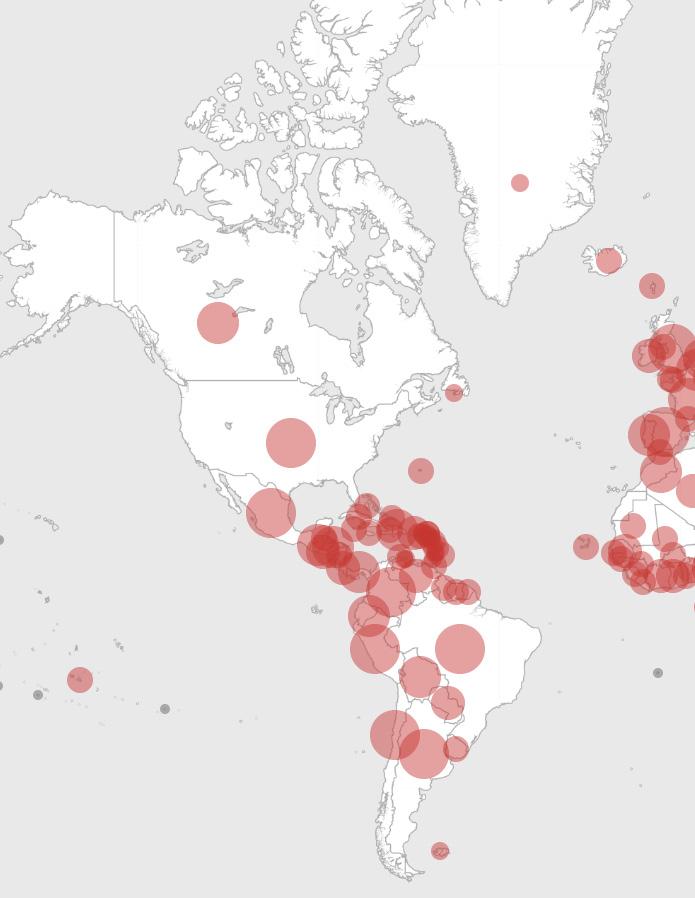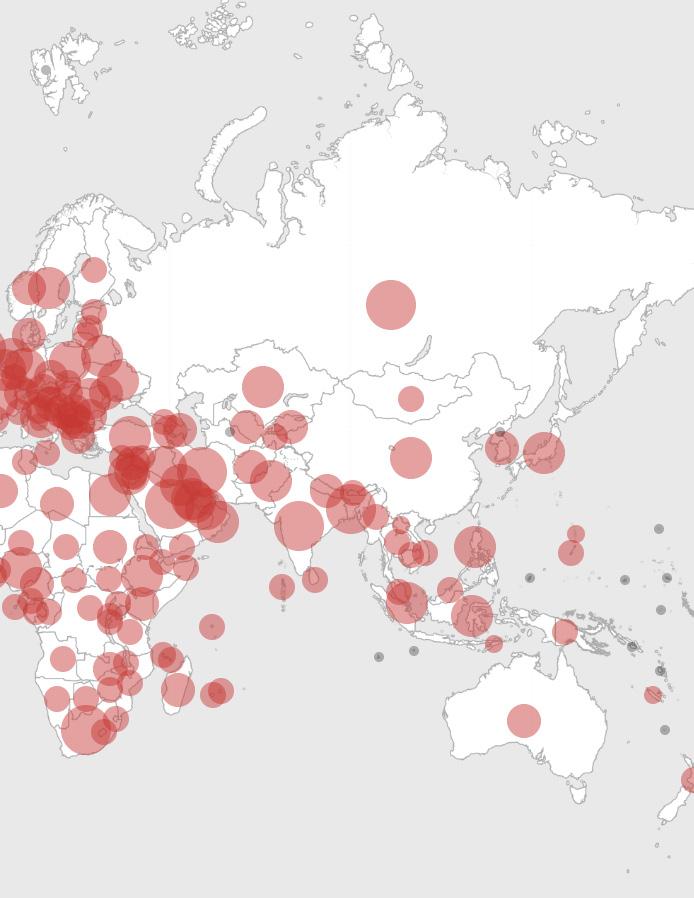
10 minute read
The Impact of Coronavirus
Pandemic Accelerates Change at Hartford Seminary

story by SUSAN SCHOENBERGER
Early March was a time of incredulity. A virus was beginning to spread across the country, but few of us had any firsthand knowledge of what that would come to mean. By mid-March, it was clear that Hartford Seminary needed to send its residential students back to their homes and move to remote operations. The day it all hit home was Friday, March 13, when our residential students, including six from the International Peacemaking Program, had to say an early goodbye. Feelings were raw, faces stretched into sad smiles. No one could quite assimilate the news that a rapidly spreading disease was infecting people around us and that institutions everywhere would have to lock down. We booked flights for students traveling to Nigeria, Indonesia, India, and across the United States. We gathered one last time in the chapel for song, prayer, and fellowship. Tears flowed. Then everyone went home. If you had walked by Hartford Seminary that weekend, it would have seemed quiet and empty. But even then, the Seminary was roaring back to life via computers, mobile phones, and networks stretching around the world, connecting to staff, faculty, and students at dining room tables, in home offices, and at kitchen counters.
Faculty were reconfiguring their courses and setting up Zoom sessions. Students were juggling their reading and assignments in a completely new way. Staff were creating protocols and communicating how Hartford Seminary would function in a state of lockdown.
Within a matter of days, it became clear that the Seminary needed to find ways to keep our community connected. Our weekly Community Hour – where staff and faculty share breakfast foods
and talk about the previous and coming week – went online as a Zoom session, as did most of our meetings. In early April, we moved our monthly interfaith chapel service online and found it so moving that we decided to have a weekly chapel. Pre-COVID chapel might have attracted 12-15 people, but our weekly Zoom chapels drew as many as 55 as we sought wisdom, guidance, as well as a place to share our fears and concerns.
As April wore on and COVID-19 cases began to explode in the tri-state area, it became clear that we would not be able to have our graduation faceto-face in mid-May. No big white tent on the lawn, no families in rented buses driving from several states away, no reception in the meeting room or photographers documenting every beautiful moment. It was heartbreaking. Instead, we dove into planning a Virtual Graduation and Reception that would attempt to bring our graduates from around the world online together for a brief, shining moment. Again, we found that moving online expanded our reach. Instead of the usual 300 or so in attendance at Hartford Seminary, our graduation was viewed more than 2,000 times on Zoom, Facebook, and YouTube.
While it has obvious drawbacks – the digital divide is a big one – operating online has brought Hartford Seminary to a larger, more global audience and, like a slingshot, propelled us toward a future we had begun to envision through a Strategic Planning process that began in 2019 (more on that starting on Page 12).
WEBINARS
With face-to-face Educational Outreach programming out of the question for the spring, the Seminary canceled or postponed all the events on its calendar. Our thoughts turned, instead, to how we could reach an audience in need of the wisdom of our faculty – folks who have spent a lifetime addressing the changing religious landscape and the needs of religious leaders across many faiths. In late March, we launched the first of 11 webinars, this one on how faith leaders could improve their virtual presence. In real time, we developed content to meet the needs around us. The second webinar, sadly, was titled "How to Conduct a Funeral Online." We held a Virtual Interfaith Seder during Passover in April, and hosted a brainstorming session about how Muslims could approach Ramadan without being able to pray together in person. We addressed the necessity of online giving campaigns and what faith leaders need to know about domestic violence at a time when many were worried about such violence increasing. Community members stepped up to provide their expertise, including a student who is active in the disaster response community and faculty members relating their own research and expertise to the present crisis. It was an effort noticed by donors, who helped support these free webinars with generous contributions.
SUMMER SESSION
As spring wore on, we all began to recognize that our usual summer session of intensive, one-week face-to-face courses would not be possible. Instead, we pivoted to translate those weeklong courses into six-week online sessions and decided to cut tuition in half for both auditors and credit students as a way to address economic upheaval and rising unemployment. Then we came up with a course that addressed, specifically, the challenges of the pandemic. Interfaith Leadership in Times of Crisis was just what our students, and many others, needed. Lucinda Mosher, Faculty Associate in Interfaith Studies, moved rapidly to craft a course that drew on case studies, scripture, devotional/theological writings, and interfaith scholarship. Students flocked to it. The course was ultimately capped at 32 students and 15 auditors, one of the largest course enrollments Hartford Seminary has seen in years. "I didn't think I could feel so connected to students, to my professor, through a screen," Alison Hager, a Master's student, said. "I felt part of a real community for six weeks - one that depended on a diversity of voices, backgrounds and perspectives." Ultimately, enrollment in our Summer Session was almost quadruple the number from 2019.
Graduation 2020 was a virtual experience this year. While we missed having everyone under the big white tent, the online graduation allowed many more to experience the occasion.
youtube recording 127
Zoom ATTENDANCE 232 LIVESTREAM ON FACEBOOK 1,800
webinars The 11 webinars we held from early April to the end of July netted 1,784 registrations
and added 400+ people to our mailing list.
2019 enrollment: 21 course registrations
2020 enrollment: 83 course registrations
Summer Session
LUCE-HARTFORD CONFERENCE
Another example of our extended reach came during the annual Luce-Hartford Conference on Christian-Muslim Relations supported by a grant from the Henry Luce Foundation. This conference has been held in early June for the last four years, and it generally attracts 60 or 70 people to two evenings of lectures and panels with networking over dinner.
A decision was made in late April to move the conference online, and as a result, 345 people registered from countries around the world to hear experts on the topic of “The Agency and Vital Voices of Women.” With the conference starting at 7 p.m. Eastern Standard Time, we had “good morning” wishes from attendees who were waking up early to join us in Indonesia, Australia, Singapore, and other countries. That rich mix of voices and perspectives was special to witness. Academic Dean David D. Grafton, who has managed the Luce Conference since its inception, said he couldn't imagine going back to an excusively face-to-face format. The virtual accessibility is here to stay.
WHAT WE LEARNED
As Hartford Seminary moves toward a new Strategic Vision, it’s clear that the global reach we have always envisioned is already here. The pandemic, while devastating in so many ways, has pushed us more quickly toward a future that we had already planned and hoped to see. That doesn’t mean the Seminary plans to go online exclusively. We can't wait to get back to face-toface classroom meetings, community prayer, and educational outreach programs when it’s safe to do so. But with the mix of technology that we’ve been forced to adapt in a time of crisis, we've been able to connect more effectively to people around the world who can enrich the conversation and join in our initiatives to build a more peaceful planet.
We have had to have all our church services online, as all church buildings are closed. This also means local churches are suffering from lack of finances. It has taught us a lot about I live in a multi-level retirement community (Homewood generosity, helpfulness, and doing a lot of phoning so people are at Frederick). After retiring in 2006 from Trinity U.C.C. in not feeling forgotten. Manchester, Maryland, my wife and I moved to Rocky Ridge,
Joy Allan Master of Arts in Religious education ’51 MD. I soon took up painting in pastels and watercolor. In 2008 I became part time pastor of the Mount Pleasant U.C.C. and remained in that capacity for eight years. In 2016 my wife
and I moved to Homewood. Here I continue with my painting. I am writing a novel of historical fiction that describes how I (autobiographical) came to embrace Islam. The novel incorporates the initial history of the Islamic Center of New Also, I have been brushing up on Koine Greek in order to read the Greek Septuagint tongue. (I have strange ideas of what constitutes fun!)
England from the view of its founders and the generations of Robert Rock
Muslims who followed. We get to know all the key members of the cast, beginning with the immigrant generation in Lebanon.
Mary Lahoj Master's Degree, Religious Studies and Christian/Muslim Relations ’92 alumni voices on the pandemic

Live-streaming services, zoom meetings with Board and membership, restarting live services, encouraging congregants to hope again. Michael Ciociola Divinity ‘70
As a New Yorker: I am being "Disciplined, Determined, Dedicated, Smart and Loving!" Rev. Dr. Robert L Bradley BMP ‘93
This pandemic made us aware and more grateful to most of the things we took for granted, I can even spend more time with my family. Due to the pandemic, I'm having most of my working activities online (thus I can stay with my parents in the village). Though I indeed miss the sense of community and non-virtual relationships, I enjoy doing a lot of things virtually. Nanik Yuliyanti IPP ‘20
I live in a multi-level retirement community (Homewood at Frederick). After retiring in 2006 from Trinity U.C.C. in Manchester, Maryland, my wife and I moved to Rocky Ridge, MD. I soon took up painting in pastels and watercolor. In 2008 I became part time pastor of the Mount Pleasant U.C.C. and remained in that capacity for eight years. In 2016 my wife and I moved to Homewood. Here I continue with my painting. Also, I have been brushing up on Koine Greek in order to read the Greek Septuagint tongue. (I have strange ideas of what constitutes fun!)
Robert Rock B.D. ‘68
alumni voices on the pandemic
I am grateful to have the virtual capacity to continue nearly all my "regular" work from home and also to be here in my local community to be part of the growing awareness of and response to racial/ economic injustice.
Jennifer Sanborn Master of Arts in Religious Studies, Spirituality ’12
During this global crises, despite it, I've been still working diligently. I have the mind set that, no challenges can prevent me from living. Also I've been encouraging others that life will improve.







